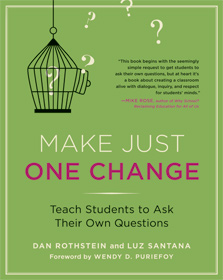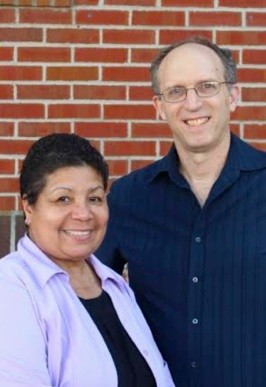I was four years old. I remember the moment very clearly. My older cousin asked me, “Why do you ask so many questions?” and I responded, “Well, I want to know more and more.” I couldn’t really explain it to her, but I just had this urge to learn about the world around me. She was, perhaps unintentionally – or even intentionally shutting down my questioning. Now every time I come across young people I try to deliberately encourage their questioning.
Prior to joining the Right Question Institute as Deputy Director, I was a third grade teacher. In my former life as teacher of non-fiction text, I invested heavily in helping my students think through how to provide well-crafted responses to open-ended questions by citing evidence and including some of their own conclusions. It was absolutely incredible to watch eight and nine year old students craft persuasive arguments and use text evidence to support their thinking – they were unknowingly rocking the yet to be adopted Common Core standards. However, more and more, I began to appreciate those moments when a student would ask a question that would get the class to think – to really think… about the context beyond the content on the page. It was simply amazing. For a while, I wondered if this was only accessible to the students who most understood the content. How could I create more of this, and create it for all of my students??
Then I remembered the Right Question Institute and all the stories of students from all backgrounds building their questioning muscle like those innovators that Hal Gregersen studied such as Steve Jobs or the ones he hasn’t yet learned of like Luz Santana and Dan Rothstein or the students who were in my third grade class. I implemented the Question Formulation Technique and my students exploded with questions after seeing a picture of a glass frog – and I felt that I was indeed beginning this journey that they would lead.
What an impact truly teaching students how to ask their own questions could have in the classroom, on their social and emotional development, and on our world. In the midst of the multitudes of teaching strategies and protocols, how wonderful it would be to get out of our way and hand the learning over to the students. We learn so much from the questions that students ask (and the ones that they don’t ask).
So if you’re looking for a New Year’s resolution, consider this one: I embrace and (dare, I say) encourage questioning. How does that sound?
How many questions have we not heard that would have pushed another student’s learning, that would have pushed our thinking, which could have eventually led to great outcomes and innovation? Questions can be so effective …. when you ask a question, the answer feels more like it’s your own!
After you’ve tried it out, come back and tell us all about it. You could even use the process we use here at The Right Question Institute.





Kudos to you for teaching your students to develop well-crafted responses to open-ended questions by citing evidence and including some of their own conclusions. In the first place, they learn to think. In the second place, they learn to communicate. Clearly, the development of these skills will help them become better students. It will also help them to develop healthy, reasonable personal and work place relationships.
Good article. As a student myself, I found that developing a well structured question can lead to a more in depth and enhanced discussion in the classroom as well as develop a path for clear communication between the students and teacher. “Success is driven by the questions you ask “. Keep up the good work.
@Molly Thank you. It was really amazing to get to work with students at such a young age really engaging with a text at such a deep level. @Ikenna I agree. In my own experiences as a student and a teacher, questions have been tremendously helpful in my development.